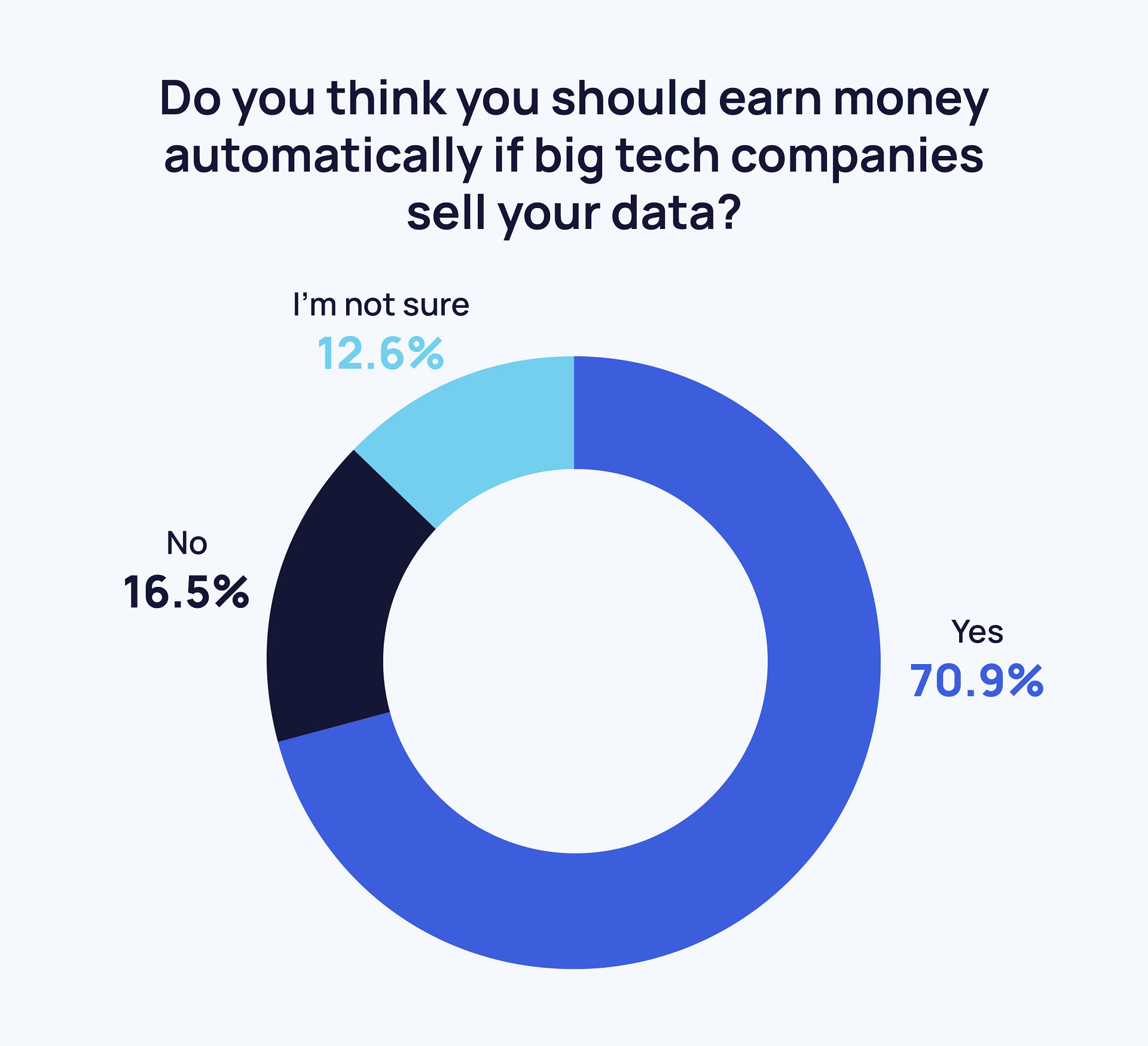Would you sell your data for profit? Nearly 50% of Americans said they would
Big tech companies already make a ton of money off your data

Sign up for breaking news, reviews, opinion, top tech deals, and more.
You are now subscribed
Your newsletter sign-up was successful
You might take your online privacy very seriously. You always connect to one of the best VPN services when surfing the net. Likewise, you also carefully read terms and conditions before clicking the 'Agree' button. You may even customize the settings of your smartphone and apps to make sure they record as less information about you as possible.
However, despite all your efforts, big tech companies are still collecting a huge amount of data about you every day. They unsurprisingly make tons of money out of it, too.
Being that data collection looks like an inevitable practice, why not gain from it yourself, then. Would you feel comfortable selling your sensitive data for a profit if you would have the means to do so?
This is exactly one of the questions that analysis firm Exploding Topics addressed to more than 1,600 Americans. And - surprise, surprise - nearly half of the respondents said they would.
Earning money from your data as a fair practice
As part of a bigger investigation, analysts from Exploding Topics reached out to 1,617 internet users living in the US to gather their views on data privacy, ownership of online content and the role of big tech companies.
Perhaps the most interesting finding is actually about the selling of personal data.
While acknowledging that these firms make a huge profit sharing users' personal data to third parties for commercial purposes, a staggering 47.9% of the respondents said they would consider selling their data for a financial gain.
The remaining half is then split between a 26.5% saying they wouldn't, and a 25.6% said to be unsure of what they would do if they have a chance to cash off their own sensitive information.
Analysts got an even stronger response when asking if users should automatically get part of the profit in case a company sells their data. Here, more than 70% agreed that it would be a fair exchange.

Which data do Big Tech collect about you?
While it's unlikely that such a practice will gain a foothold in the big tech sector anytime soon, you can at least make some more conscious choices on which information to share and with whom. For this, it's important to exactly know the types of personal data these companies hold about their users.
Companies record an array of personal information about their users directly from them. These include their name, phone number, email address, home address, payment details, username, passwords, and even the emails they write and/or receive.
Another set of data fall into the category of unique identifiers characterizing the device you use to go online. These include IP address, device and/or browse type, system activity record and details on URL requests.
Then, there are specific information that got collected about users' activities. These can be the search terms they look up for, shared messages, content accessed and duration of their online session.
Additional data that big tech companies hold on users comes from their location information, like the time zone they're connected to and GPS movements. Companies might even obtain information about their customers from publicly accessible sources such as newspapers, advertisers and credit bureaus.
Among the biggest companies on the market, Google wins the gold medal for the most data collected. Whereas, Apple seems to be the one doing the most to safeguard its customers' privacy. Also, the two main social media platforms Twitter and Facebook look like they're storing more data that they need to.
As you can see, for companies, it's effortless wildly exploiting users' personal information for their financial gain. This is why governments around the world have been busy crafting new laws to cope with privacy issues linked to today's digital society.
The concept of data minimization is critical here. At the base of many worldwide data privacy legislations like the EU/UK GDPR and the proposed American Data Privacy and Protection Act, it allows companies to collect only users' information strictly necessary to provide a specific service in the most transparent way possible.
Ways to minimize data collection
The way big tech companies and governments act is not the only factor impacting users' data collection, though. Individuals can do their part to take some agency back over their personal information.
We mentioned before how a VPN service can help boost your privacy. This is because it spoofs your IP location while encrypting your data in transit inside its secure VPN tunnel. Pick a no-logs VPN provider to make sure that none of your personal information would ever be recorded.

You also have a few alternatives to better secure your personal conversations. A messaging app powered by end-to-end encryption, like WhatsApp, Signal or Telegram, is a must-have. There are also secure email services preventing anyone else reading your emails. One of our favorites is ProtonMail, developed by the same Swiss-company behind the secure VPN service Proton VPN.
You should also consider using an anonymous browser and private search engine. Tor browser is a must-have when online privacy is paramount, as it secures your data inside three encryption layers. It's a bit slow, though, but totally free to use. While, a good alternative to your data-hungry search engine is DuckDuckGo.
Besides more private software and other security services, there are also some actions you can take to stay on top of your digital hygiene. These include regularly changing your passwords, turning off location data collection from apps that don't need this information to function, and keeping deleting your cache history record from your browser.
As a rule of thumb, keep yourself informed about who you're trusting with your data, while minimizing the personal info you share as much as possible. Not a financial revenue in here, but you will gain in online anonymity at the very least.

Sign up to the TechRadar Pro newsletter to get all the top news, opinion, features and guidance your business needs to succeed!

Chiara is a multimedia journalist committed to covering stories to help promote the rights and denounce the abuses of the digital side of life – wherever cybersecurity, markets, and politics tangle up. She believes an open, uncensored, and private internet is a basic human need and wants to use her knowledge of VPNs to help readers take back control. She writes news, interviews, and analysis on data privacy, online censorship, digital rights, tech policies, and security software, with a special focus on VPNs, for TechRadar and TechRadar Pro. Got a story, tip-off, or something tech-interesting to say? Reach out to chiara.castro@futurenet.com